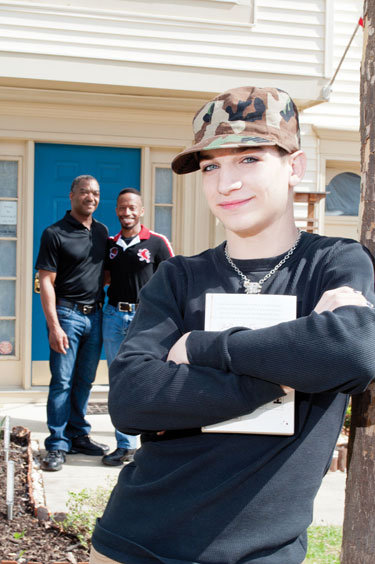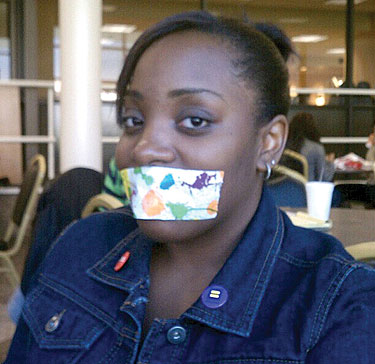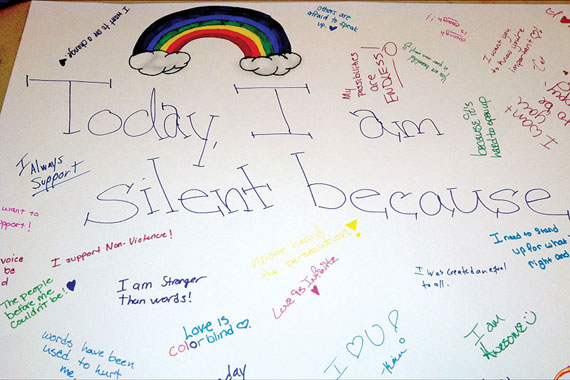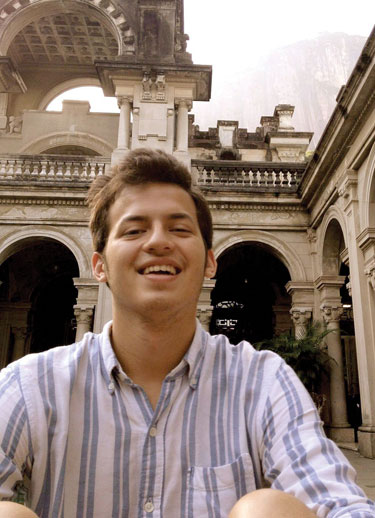Spring, despite its lingering chill in 2014, is a time to think of birth, of growth, of renewal. That means youth – LGBT youth, in particular. Like D.C.'s spring, LGBT youth can also be chilly – and sunny and breezy and all the rest. There is no universal template for people, certainly not the youngest among us. They are bois and grrrls, queer and kindred. They are everything at once, coming out, testing their wings and getting a better look at those generations ahead of them who have laid the groundwork, and whom they will gradually replace.
In the D.C. metro area alone, they represent thousands of unique perspectives. Ahead of the Youth Pride Alliance's May 3 Youth Pride Day, Metro Weekly checked in with three of them.
From Mean Streets to Easier Street

Lundyn Terry-Smith with Justin and Philip
(Photo by Todd Franson)
In the world of Annie, a hard-knock life means a nasty orphanage full of toil and show tunes, with a ''Daddy'' Warbucks tap-dancing along to make your life magic. In the world of Lundyn Terry-Smith, things worked a little differently.
''I was living in Baltimore City and I was homeless,'' says Terry-Smith, now 17, of a time shortly after he'd turned 14. The abuse, he says, came primarily from his father. While his mother wasn't abusive, she was also long absent – since he was 8 months old. But there was also abuse at school. ''In elementary school, I got along okay. In middle school it was a little bit tougher, because that's when I figured out I was gay. In high school, it was just terrible. I never really came out and said, 'Hey, I'm gay.' People assumed, and they were correct. That's just how it was. I did get bullied a lot for it. It got pretty bad. It got to the point I was fighting every day, getting shoved in lockers, all that other good stuff.''
The way out, as Terry-Smith saw it, was to run away from home. And, indeed, that ended the daily abuse. Still, the trajectory of his life was far from taking a positive turn. Things were going to get much worse before they got better.
''I was jumping from house to house, with friends and stuff,'' Terry-Smith says of the start of his life on the streets. ''Then I found an abandoned home. It had a couch, and the electricity hadn't been shut off. I stayed there for a little bit. I got addicted to some pretty nasty drugs. Finally, I got really tired of that life. I went to my aunt for help.''
Cue the happy-ending music? Oh, no.
Terry-Smith's aunt was able to get him off the streets and into a 90-day program operated in Maryland by Texas-based Arrow Child & Family Ministries. As a self-identified Pagan, Terry-Smith says his experience with the Christian social-services provider may have provided him a safe harbor, but did little to assuage his sense of isolation.
Whatever his feelings about Arrow, the program did, at least, get him a step closer to that happy ending. Still, Terry-Smith clearly remembers his dissatisfaction coloring his first meeting with Justin and Philip B. Terry-Smith.
''The first thing I said was, 'Get me the hell out of here.'''
The shared last name is the spoiler -- you know where this is going. Following months of getting acquainted and the attendant paperwork and court dates, Lundyn Terry-Smith is officially – right down to the legal last name – part of the family, living in Maryland with his two dads, and thriving in ways that have given him a new lease on life. Not only does he have a roof over his head, but he's also got his own bathroom. And, unlike plenty of people his age, Terry-Smith seems to embrace his chore list.
''It's right here if you'd like me read it to you,'' he says. ''Sundays I have to dust surfaces and do the kitchen floor. Monday is two hours of studying. Tuesday is my laundry day. Wednesday is trash day. Thursday, I have to clean my bathroom. Friday, I have to clean and vacuum my room and the hallway. Saturday, I have to dust and vacuum the living room and dining room.''
He even makes dinner once a week: ''Thursdays are my night to cook. Last night I cooked orange chicken. It was the first time I ever made it. It turned out really good.''
In a safe and stable home, Terry-Smith can actually turn his attention from staying warm and fed – or feeding an addiction – and concentrate on the here and now. He's continuing his high school education online, often heading to Anne Arundel Community College with his father Philip, who serves as an assistant professor of sociology there, and crafting a future as a cosmetologist and professional belly-dancer. That's not all he's got planned for the future.
''April 12, 2013,'' says Terry-Smith. That's the day his fiancé, José, popped the question. ''We've known each other since we were little. He found me and messaged me online. He reminded me who he was, then he told me he was gay. We kept talking and things happened.''
Terry-Smith says the marriage will have to wait a couple years, until José's Army tour ends, but a boy can dream.
''Justin will walk me down the aisle, and Phil will marry us,'' he says of the fixed points. Attire is still up in the air. ''I kind of want to wear a dress to my wedding and be all dragged up. But I'm debating.''
Terry-Smith is more definitive, however, when it comes to where the community could do a better job regarding the younger end of the LGBT spectrum. He says there's a critical need for more service organizations that target LGBT youth, for more culturally competent support groups to help them navigate these first years of having an LGBT identity.
In the meantime, he, at least, has found his own support group.
''Not only do I have homosexual parents, but I have the large group of LGBT friends that they have,'' he says of the social circle he adopted along with his socially prominent parents. ''I feel so welcome. It's amazing. I have such a large support group now. I wish everybody did. Without it, life gets pretty hard.''
Seems Lundyn Terry-Smith's ''Tomorrow'' has already arrived, and the sunshine couldn't be much brighter.
Accepted and Excelling

Simone
In April 2012, Maryland's Bowie State University made history. Two years ago, it became the first of the ''Historically Black Colleges and Universities'' (HBCU) to establish a permanent resource center specifically for ''lesbian, gay, bisexual, transgender, queer and intersex'' students.
Not long after, Simone Mathis made her own history by starting college – at Bowie State, of course – where she discovered not the resource center, necessarily, but the school's Gay-Straight Alliance (GSA).
''One of my friends from high school had already been a member of the GSA,'' Mathis, a Beltsville native, recalls of her first year in college. ''He took me one day and I loved it. My next semester, I became the treasurer. The semester after that, I ran for president.''
Today, a 20-year-old sophomore majoring in English, Mathis continues as president of the GSA on a campus she characterizes as neither hostile nor overtly welcoming. Rather, everything is just comfortably matter-of-fact.
''It's not like we're secluded,'' Mathis says of her GSA's role on campus, with about 30 to 35 members. ''We're involved in some of the on-campus activities. It's just like being any other student. Every year we mark the Day of Silence. We do LGBT History Month every October with certain events. Every now and then we'll throw in a random one. We do try to stay active.''
The low-key yet involved nature of the Bowie State GSA fits Mathis perfectly, in that her own life has run largely along the same lines. Coming out might have thrown a couple bumps in the road, but they were tiny and easy to navigate.
''Coming out, I lost a significant amount of friends,'' she says, remembering being 15 years old at Bowie High School. ''Other than that, the people who were really my friends stood by me. 'It's okay. We love you for who you are. That's fine.' Coming out to my parents was a little more difficult. I didn't actually come out; they just found out. That was a little difficult. But my family and friends love me for who I am. It really wasn't that hard.''
Not only did she find family acceptance, she found it in abundance.

''I live at home with my mom. She loves me. She loves my girlfriend – my girlfriend lives here now, too,'' Mathis shares. ''My mom likes to take in everybody, so all my sisters still live here, and my aunt and grandmother live with us. We're big family people.''
As for that girlfriend, a student at Baltimore's Stevenson University, it's a relationship that illustrates another corner of Mathis's life where being a lesbian has just not caused much of a ripple.
''We grew up together, went to church together,'' says Mathis, referring to Beltsville's Queen's Chapel United Methodist Church. ''She used to be the youth pastor for our church. We're still pretty active. Our church is full of family members.''
So, welcoming campus, welcoming family, welcoming church? ''Yep. That's very lucky,'' she confirms with a playful laugh.
Despite the apparent ease that colors Mathis's life, she still sees room for improvement, and it comes down to a practical dollars-and-cents sensibility.
''Definitely more scholarships,'' Mathis answers immediately when asked what the older end of the LGBT community might be able to offer its younger counterparts. ''I cannot stress that enough. As a struggling college student, definitely more scholarships. Every other race, ethnicity, group has a scholarship for something. I don't think we have that many. We definitely need more scholarships.''
If things go as planned, one day it might even be Mathis' students applying for such scholarships, as she has her sights set on being a high school English teacher. Sponsoring a GSA for her students, wherever she might land, is also on her radar, as are kids of her own. Whatever her future holds, exactly, it's a fairly safe bet that Mathis will bring to the world the kind of acceptance and community that the world has already shown her.
SMYAL's Eager Ambassador

Marco Hernon
Supporting and Mentoring Youth Advocates and Leaders – née the Sexual Minority Youth Assistance League, but best known as SMYAL, whatever the iteration – throws a heck of a brunch every year. In 2013, it featured Marco Herndon, a young man who moved to Arlington, Va., from Georgia, ahead of his sophomore year of high school, roughly five years ago. SMYAL had asked him to come and share his experience with the organization.
''I talked about how SMYAL has affected my experiences as an LGBT youth,'' Herndon recalls. ''I talked about how I learned a lot of leadership skills through them. I talked about how they exposed me to the diversity of the LGBT community. Growing up in the suburbs in Arlington, I didn't have exposure to a lot of LGBT youth. SMYAL exposed me to a lot of different types of LGBT youth and experiences. What I knew of gay culture was mainly Dupont Circle, or very well-to-do gay men. … It was the first time I met transgender youth who were my age. Just knowing there were other LGBT youth in the area was really cool. I got to express myself in ways I couldn't in high school. I was always trying to act 'not too gay.' In this other space, I was able to just be myself. It really challenged me, as well. Through SMYAL, I learned that there are a lot of different experiences.''
That foundation has had a great influence on Herndon's experience at the University of Pennsylvania in Philadelphia, where the 20-year-old is focusing on urban and legal studies. From finding SMYAL when he was 16, to volunteering, to becoming a member of SMYAL's Youth Advocates Program during his senior year of high school, Herndon learned not only more about himself and his community, but also about communicating in a variety of environments and about the nuts-and-bolts of operating a nonprofit. All of it useful.
''I'm part of the Lambda Alliance at UPenn. It's the undergrad umbrella organization for LGBT students. I'm on the board, pretty involved with that,'' Herndon says of campus life. ''I've also been able to explore more intersections of the LGBT community. I'm Latino. I've been able to understand what it means to be a Latino gay man within the wider LGBT community. As part of my role in this organization on campus, I've had to organize retreats. I've evolved a lot of the skills I started learning at SMYAL. Whenever I have to plan something or talk about these types of issues, when I have to talk about these 'soft skills,' I always think back to conversations or events at SMYAL. That was a really good starting point in learning how to talk about social issues, learning how to tackle them.''
It's also a question of conversations, he says, when thinking of what's lacking for his generation – young gay men, in particular. Herndon would like to see more conversations about sex, more guidance from the older generation, in an effort to counter high HIV infection rates among his peers.
''My generation of gay men, we have this pervasive hook-up culture, but we don't really have a lot of exposure to what it means to be an openly gay young person,'' says Herndon, describing his generation as pioneers of sorts, a group that may have come of age in high schools with Gay-Straight Alliances – but among the first to do so. Their age of exploration and identity is beginning younger than their forefathers', but without the cultural infrastructure of their straight peers. ''I'd argue we're one of the first generations to be totally open, but there's no real standard, no format. We don't really have an idea of how relationships are supposed to work at our age.
''The HIV/AIDS crisis is happening all over again with LGBT youth, especially 17 to 24 year old gay men, who are the most prone to HIV. There are a lot of different stress points on a young LGBT person. We don't feel like there's a place in the mainstream LGBT movement that's concerned about this.''
Youth leaders like Herndon – with skills learned at SMYAL – may be the ones to start the conversation. While Herndon offers that message to an older generation, he also has a message for those a bit younger, living in the D.C. area, across the LGBT spectrum.
''I'd like them to know that SMYAL is a place where you can be yourself, but that it's also a place that challenges you to think about who you are, and it challenges you to be independent,'' says Herndon. ''It makes you think about your identity in a multidimensional way. It's not just about being lesbian, gay, bisexual, transgender or queer youth. It's also about exploring the wide array of things that define you. In exploring that, you really empower yourself. You realize you can't be reduced to just one thing, that your identity is really a collection of things.''
The Youth Pride Alliance's Youth Pride Day is Saturday, May 3, from noon to 5 p.m., in Dupont Circle. For more information, visit youthpridedc.org.
...more